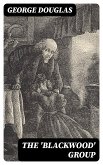In 'The 'Blackwood' Group,' George Douglas masterfully navigates the intricate web of 19th-century Edinburgh's literary scene, unraveling the lives and creative endeavors of the influential Blackwood'Äôs Magazine collective. Through a blend of rigorous historical analysis and evocative prose, Douglas crafts a narrative that captures the ethos of the period, highlighting the group's contributions to Romantic literature and their role in shaping the cultural landscape of Scotland. His acute insights into the stylistic nuances of the era render this work not only a scholarly resource but also a captivating read for those interested in the interplay between literature and society. George Douglas, a prominent literary scholar, draws on his comprehensive background in Scottish literature and history to bring depth to this exploration. His previous works on Romantic poets and their contemporaries reveal his lifelong passion for the intricate dynamics of literary movements. Douglas'Äôs understanding of the socio-political circumstances that surrounded the Blackwood group informs his nuanced interpretations, providing readers with a rich context in which to situate their writings. This book is an essential addition for readers, scholars, and students alike, eager to delve into the nuances of literary history. Douglas's engaging writing style, combined with his profound scholarship, invites readers to appreciate the significance of the Blackwood group and their lasting impact on literature.
Dieser Download kann aus rechtlichen Gründen nur mit Rechnungsadresse in A, B, BG, CY, CZ, D, DK, EW, E, FIN, F, GR, H, IRL, I, LT, L, LR, M, NL, PL, P, R, S, SLO, SK ausgeliefert werden.
Hinweis: Dieser Artikel kann nur an eine deutsche Lieferadresse ausgeliefert werden.









